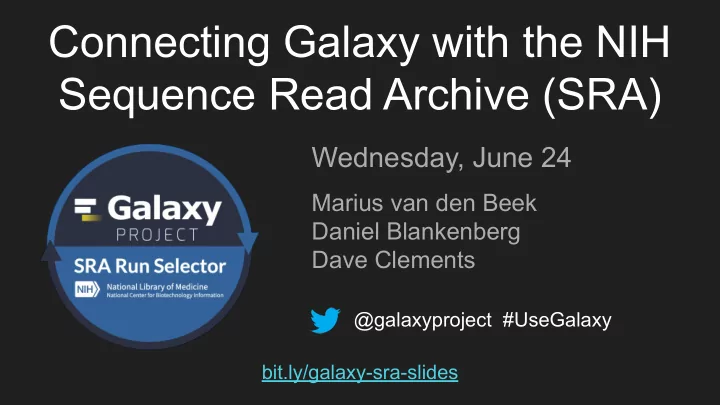

Connecting Galaxy with the NIH Sequence Read Archive (SRA) Wednesday, June 24 Marius van den Beek Daniel Blankenberg Dave Clements @galaxyproject #UseGalaxy bit.ly/galaxy-sra-slides
Agenda ● SRA? ● Galaxy? ● SRA + Galaxy! ○ A live demo Please ask questions using the Zoom Q&A window, as we go.
“Is there anything you would like to specifically learn about in this webinar?” Today: Not Today: Um, maybe? ● How to import SRA fastq files to ● assess QC metrics ● The meaning of life galaxy online before analyses ● Benefits of the Galaxy/NCBI ● Using all features in partnership! Galaxy ● SRA data integration in Galaxy! ● Expression analysis ● how to fetch multiple SRA data ● Bacterial whole sets to perform a bioinformatic sequences submission analysis in the Galaxy platform ● Submission of RNA seq ● how to import SRA fastq files to files (transcriptome) data galaxy online to sra database. ● are there are limits to how many ● BLAST SRA datasets can be imported at once?
Sequence Read Archive (SRA) ● Poll ● SRA is NIH’s primary archive of unassembled reads ● SRA is a great place to get the sequencing data that underlie publications and studies ○ All of SRA now on AWS, GCP clouds You will also hear it referred to as the Short Read Archive , its former name. https://www.ncbi.nlm.nih.gov/sra @NCBI
Entrez and SRA Run Selector ● Two interfaces to SRA data that complement each other ● Today you will see both.
NIH has released a request for information (RFI) to solicit community feedback on a proposed Sequence Read Archive (SRA) data formats . Learn more and share your thoughts at https://go.usa.gov/xvhdr. The response deadline is July 17th, 2020 . We encourage you all to share with your colleagues and networks, and respond if you are an SRA submitter or data user.
Galaxy ● Poll ● A data integration and analysis platform for life sciences data ● A worldwide community of users, trainers, developers, infrastructure providers, tool developers, and software engineers https://galaxyproject.org/
Galaxy is available ● At over 100 free, online web servers ● On commercial and academic clouds ● In containers and virtual machines ● As open source software that can be installed anywhere https://galaxyproject.org/use/ https://getgalaxy.org/
Galaxy training materials ● Galaxy is used by scientists from many domains ● Detailed tutorials and workflows available ● Everyone can contribute https://training.galaxyproject.org/
SRA + Galaxy: A live demo ● Our experiment ○ COVID-19 datasets ○ But , our domain does not actually matter ○ Today we are focused on the integration and this integration can be used with SRA data in any domain ● The plan ○ Go from Galaxy to SRA to Galaxy to get sequence metadata, including SRA accession numbers ○ Get the sequence data from SRA ○ Run a short analysis in Galaxy using the SRA data usegalaxy.org bit.ly/galaxy-sra-tutorial
Some caveats ● Submitters often do not provide complete/correct metadata ● There is a discrepancy between SRR and ERR entries ● In some cases downloads fail https://bit.ly/galaxy-sra-history
SRA Resources Galaxy Resources Questions? Contact the NCBI team at ● galaxyproject.org/ sra@ncbi.nlm.nih.gov ● help.galaxyproject.org/ ● gitter.im/galaxyproject Additional resources ● usegalaxy.{org|eu|org.au} ● bcc2020.github.io ● https://www.ncbi.nlm.nih.gov/sra ● https://www.ncbi.nlm.nih.gov/sars -cov-2/ Submitting data? ● https://submit.ncbi.nlm.nih.gov/
Thank you! NCBI Yuriy Skripchenko NIAID Lydia Fleischmann NHGRI Ravinder Eskandary Kurt McDaniel NSF Sergiy Ponomarov Galaxy Community
Recommend
More recommend